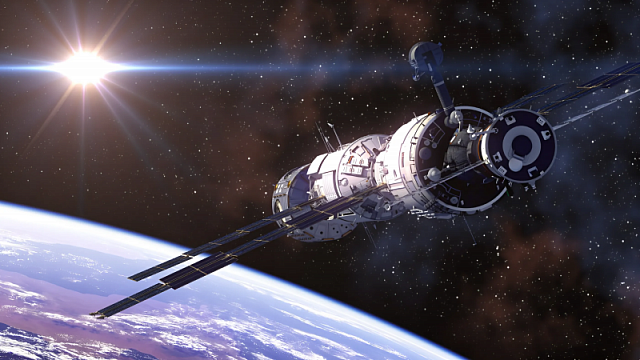12.04.24
12:56
Space development in BRICS countries
How the BRICS countries co-operate in the field of space exploration
12 April 1961 is a special date for Russia and the world that divided the history of mankind into before and after. On this day, 27-year-old Yuri Gagarin made the first human space flight. The Soviet pilot-cosmonaut spent 108 minutes in orbit and returned to Earth.
After this expedition, many nations began to develop their own space programmes. Co-operation in this field between countries increased and joint projects were established. According to the decision of the UN General Assembly of 2011, 12 April is celebrated worldwide as the International Day of Human Space Flight.
Development of the space industry in Russia
The USSR and then its successor Russia have historically been recognised space powers. These two nations have many achievements and records to their credit, including the launch of the first artificial satellite, the first man in outer space, the first woman in space, the world record for flight duration, and others.
The country currently has several cosmodromes
Russia has developed its own global satellite navigation system – GLONASS.
Since the beginning of space exploration, mankind has launched a total of 16 orbital stations, most of which were launched by the USSR. The first of them was launched into orbit by a Proton-K launch vehicle on 19 April 1971. After that, the Soviet Union sent six more Russian orbital stations into space, the last being Mir station, which operated in space from 1986 to 2001. The successor to Mir was the International Space Station, a project in which Russia is a permanent participant.
Other BRICS countries’ achievements in space
India’s achievements
The Indian Space Research Organisation (ISRO) is one of the largest space technology agencies in the world. The organisation was established in 1969 and has contributed a lot to space exploration during its existence. The first Indian astronauts (Gaganyaan mission) are scheduled to fly in 2025. By 2035, according to the country’s Prime Minister Narendra Modi, India could have its own space station.
China’s achievements
China has made significant strides in space exploration over the past two decades, from the launch of its first manned mission in 2003 with taikonaut (from the Chinese word for space) Yang Liwei to the construction of the China Space Station (CSS) in 2022.
The project, which involved more than 1,000 national companies representing an industrial chain worth more than 1 trillion yuan (about US$139 billion). In the near future, the Chinese plan to build automatic as well as manned rockets to fly to Mars and the Moon.
Brazil’s achievements
Brazil has its own spaceport – Alcantara, the first launch from which took place in 1990. In 2022, the country launched a national space rocket into orbit.
Iran’s achievements
The Iranian Space Agency was established in 2004 and since the beginning of its existence has established the republic as a country with a serious space programme. Since then, Iran has successfully put several satellites into orbit and launched several animals into space.
Saudi Arabia’s Achievements
Saudi Arabia inaugurated its space programme in 2022 and sent astronauts Rayana Barnaoui and Ali Al-Qarni to the ISS in 2023. The UAE embarked on space exploration in 2006 when Sheikh Mohammed bin Rashid Al Maktoum, the country’s prime minister and ruler of Dubai, founded the Emirates Institute for Advanced Science and Technology. Nine years later, it was used to establish the Mohammed bin Rashid Space Centre. In 2020, the UAE sent the Al Amal interplanetary station to Mars. In April 2023, Emirati astronaut Sultan Al Neyadi became the first Arab to enter outer space.
Egypt’s achievements
Egypt established a space agency in 2016. In 2023, the country launched an Earth observation satellite using a Chinese rocket.
BRICS co-operation in space
The development of cooperation in space research is undoubtedly one of the priorities of scientific and technological cooperation between the countries of the association. In September 2018, the incumbent head of Roscosmos, Dmitry Rogozin, announced that Russia could create a lunar research station together with the BRICS countries. In August 2021, the heads of the space agencies of the association’s countries signed an agreement on the exchange of Earth remote sensing data. In May 2022, the first meeting of the BRICS Joint Committee on Space Cooperation was held.
In August 2023, Indian Prime Minister Narendra Modi proposed that BRICS form a joint association for space research. In 2024, the Russian scientific community proposes that the BRICS member countries discuss joint research on the Moon.
“The range of areas for co-operation is enormous: exploration of near-Earth space, climate research, manned space flights, creation of satellite systems, lunar and interplanetary missions, etc. Successful realisation of such large-scale and expensive ideas is possible only through joint efforts. Of course, the BRICS countries have experience of cooperation and joint projects in the space industry, but mostly in a bilateral format”
Oleg Alekseenko Expert in politics and international relations
The expert added that now it should be a question of creating a consortium, which will maximise the use of scientific and technological capabilities of both experienced space players and states that wish to join the club of space powers.
The trends of the last two years in BRICS S&T cooperation show a steady increase in the number of joint publications in the fields of physics, mathematics, astronomy, which is an indirect sign of capacity building and strengthening of cooperation in applied scientific projects, including space exploration.
Photo:
iStock
Back

